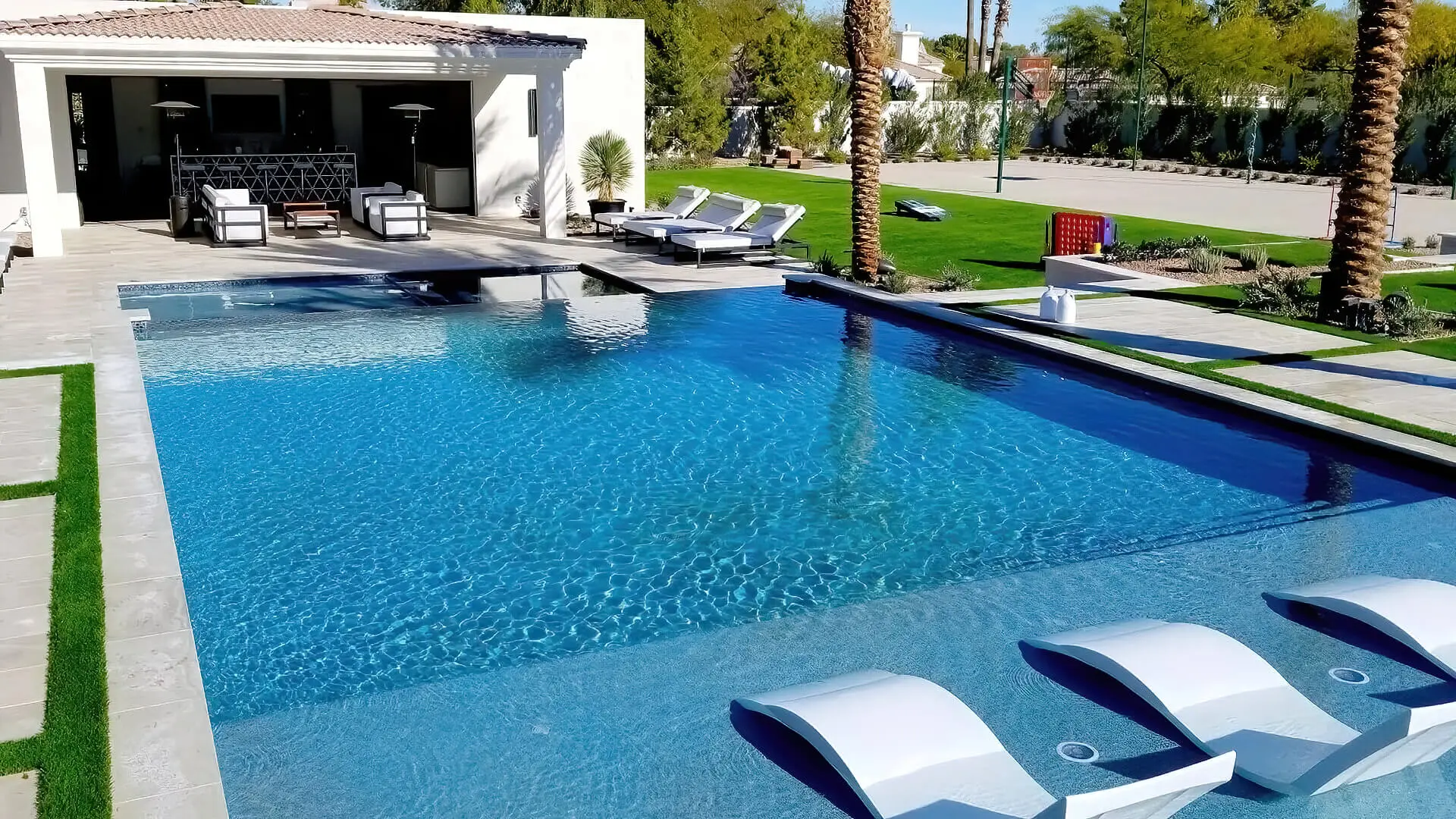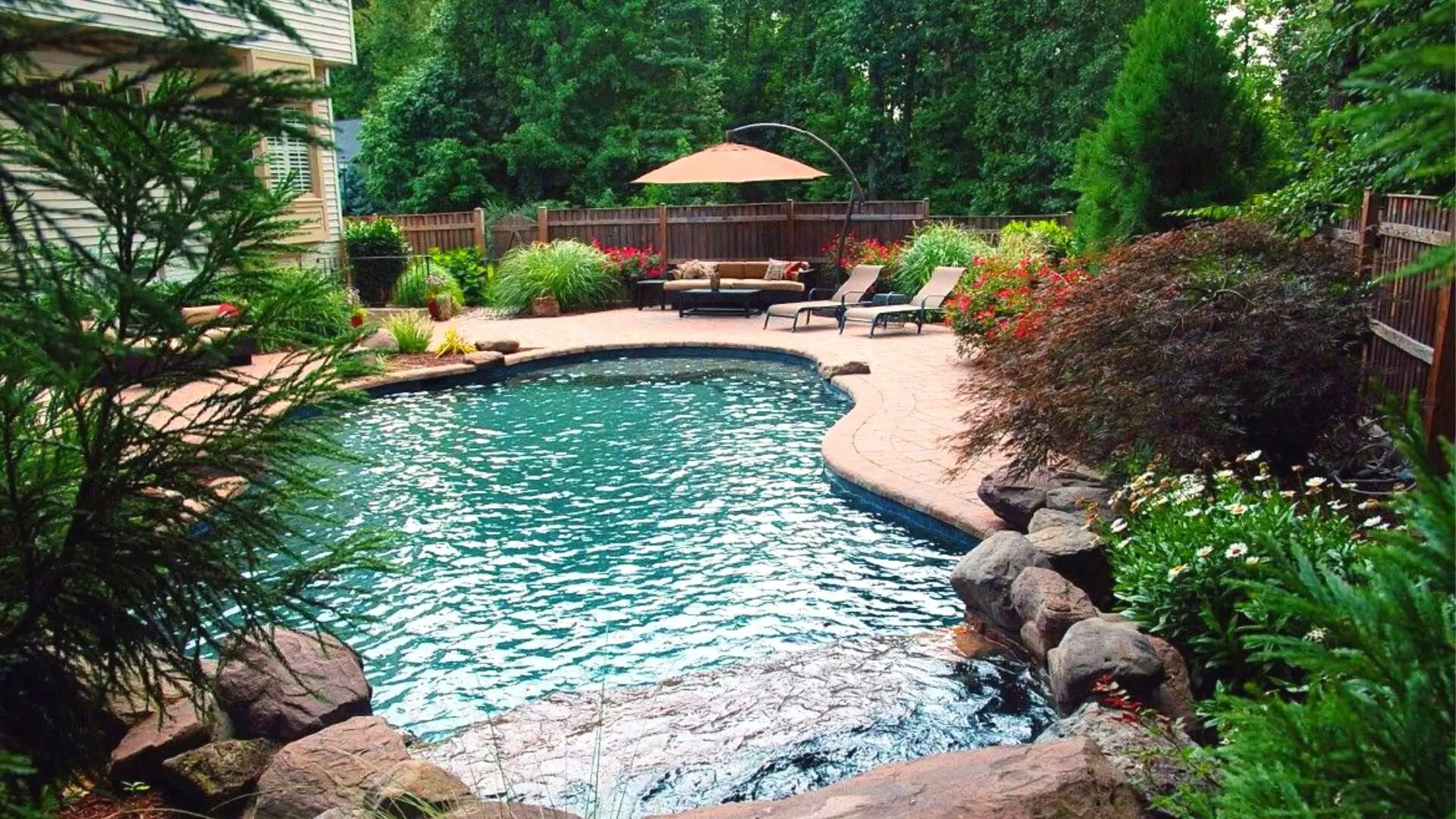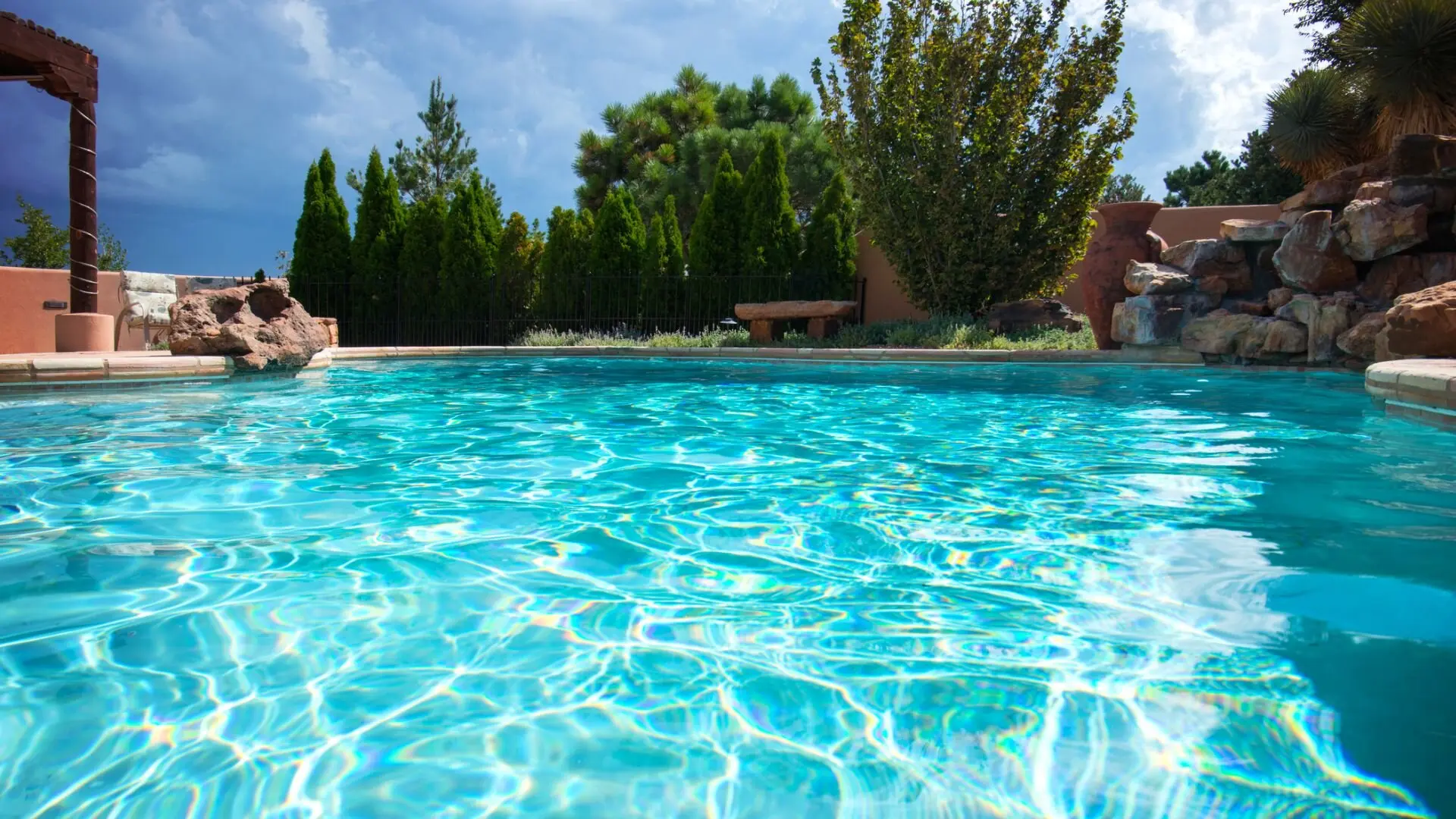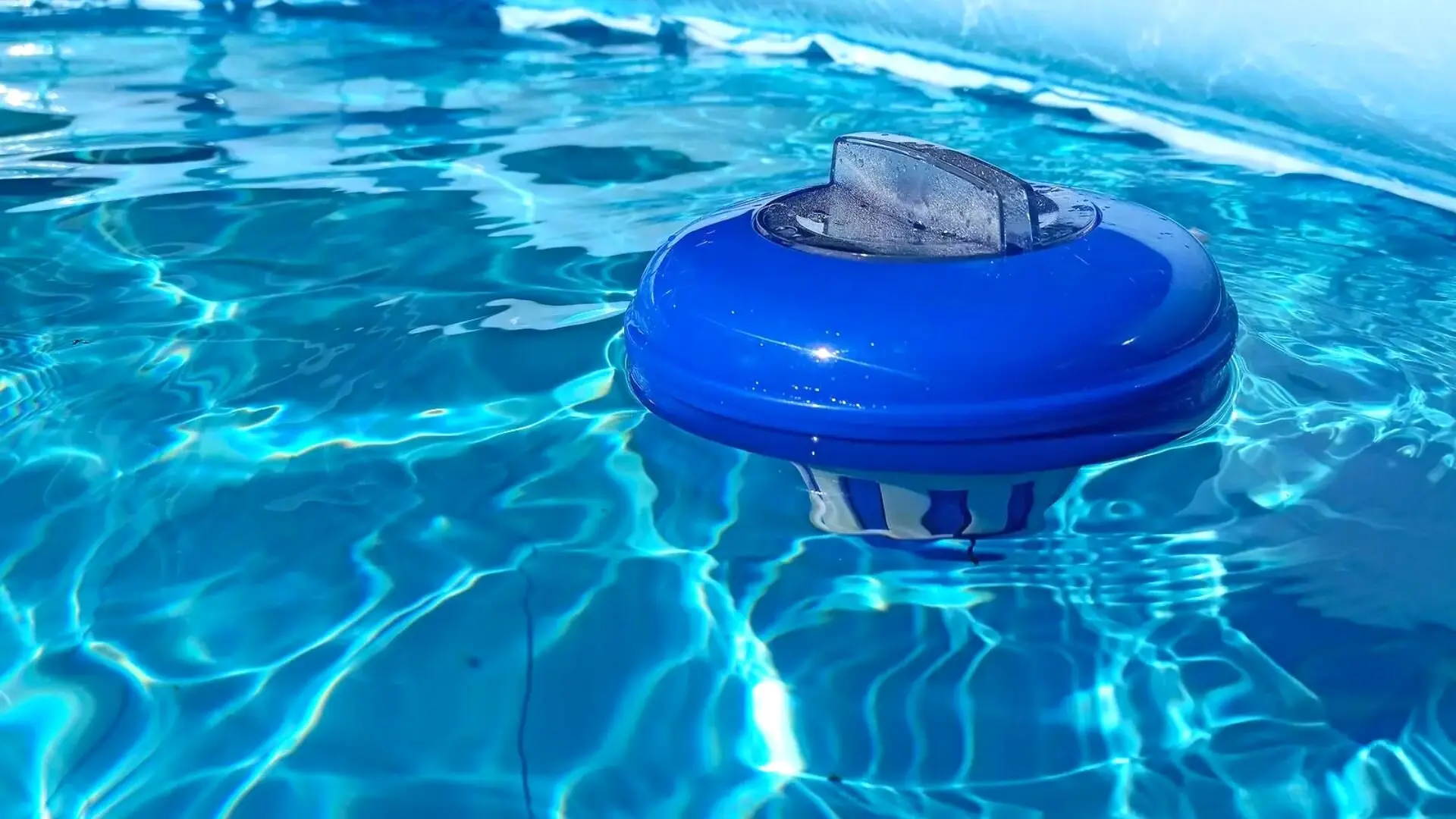Let’s agree that a home isn’t complete without a pool!
Especially in Australia, with a staggering 1.2 million backyard pools, you don’t need us to tempt you to install one. But you will need us while deciding whether to opt for a saltwater or chlorine pool, even if you plan to renovate your existing one.

We thought it’d be best to curate a guide featuring everything you know about salt water and chlorine pools.
With all said and done, let’s begin!
What Is A Saltwater Pool?
One of the biggest misconceptions surrounding saltwater pools is that they don’t need chlorine for purification. Although you don’t need to add chlorine regularly as you’d for chlorine pools, a fair bit of chlorine is still involved through a process called “electrolysis.” It produces just enough chlorine to disinfect the pool.
Without getting too technical, the entire process of chlorination takes place with the help of special equipment (chlorine generator) and ordinary salt. The former turns salt into a substance known as hypochlorous acid, which is also used in traditional pools.
As the hypochlorous acid combines with the remaining sodium in the water to form a salt, it reduces the need for additional chlorination because salt doesn’t evaporate quickly. As a result, the treated water is softer and negates the side effects of chlorinated water. This is why saltwater pools are becoming popular in residential and commercial spaces. So, before switching to a saltwater pool, let’s check out the benefits:
Saltwater Pool Pros:
Aside from those mentioned above, there are multiple advantages to a saltwater pool. So, we thought of listing them down in the following sections for your convenience:

1. Gentle On The Eyes And Skin
As you may already know, swimming in chlorinated water does not usually cause swimmers to develop red and itchy eyes for long periods. Moreover, compared to seawater, which has around 35,000 parts per million salt, saltwater pools have significantly less pool salt concentration, with only 3,500 parts per million. This mimics the natural concentration found in human tears, gentler on the skin and eyes.
2. Clean And Sanitised Water
Since saltwater is not entirely chlorine-free, you don’t have to worry about unclean water. The chlorine produced in sodium hypochlorite and hypochlorous acid is as effective in neutralising algae and bacteria as other chlorine additives. At the same time, they don’t have that irritating “chlorine smell” like traditional pools.
3. Alleviates Breathing Trouble
Chlorine is known to aggravate lung irritation, asthma and allergies in swimmers. Hence, if your family or friends are sensitive to chlorine pools, you should consider installing a saltwater pool. Mild or soft water can alleviate many symptoms associated with lung irritation. This feature will benefit kids or athletes who want to immerse themselves in the water for extended periods.
4. Low Maintenance Efforts
In general, it’s easier to own and maintain a saltwater pool. Since the salt cell system is primarily self-contained, there isn’t much to monitor the chlorine levels. Similarly, in ideal conditions, cleaning the pool once a year should be sufficient when you want to drain and scrub the pool.
5. Reduced Soreness
Swimming in salt water can effectively promote the body’s natural relaxation process. Likewise, exposing the muscles to saltwater can help eliminate soreness while relieving pain and stiffness from injuries or conditions like arthritis.
6. Environmental-Friendly
Due to the low amount of chlorine in saltwater pools, there’s minimal chlorine gas emission in the environment, keeping your surroundings safe to breathe.
Saltwater Pool Cons:
For all the good, there are certain downsides to a saltwater pool that you’d want to consider other than the cost and how much salt to add to your pool.

1. Expensive Installation
Knowing that saltwater pools have costly upfront installation charges may be helpful. For a decent model, the cost of a chlorine generator can vary between $900 and $1,000.
On top of that, the salt cells will need replacement every 3 to 7 years, costing between $300 and $800. However, the replacement frequency will largely depend on the intensity of use.
Sodium hypochlorite and hypochlorous acid can cause a sudden rise in the pH level of the water. So, there’s the added cost of procuring the necessary chemicals to balance the pH.
2. Complicated System
Saltwater pool systems don’t have many maintenance needs, but the mechanism is complicated compared to traditional pools. This means you must seek professional help in case of any big or small malfunction.
Besides, a pool-grade saltwater system tends to be corrosive for related fixtures like pipes, lights, ladders, etc., leading to frequent renovations. Likewise, the water can damage the deck if not built with saltwater-resistant material.
What Is A Chlorine Pool?
Widely referred to as “traditional pools”, chlorine pools are named after the most common chemical used to treat the water. Most homeowners prefer having a chlorine pool because it is easier to maintain and install. That’s why it’s a popular choice among first-time homeowners who might not want to spend a fortune on installing a pool.
On that note, let’s look at the notable advantages of having a chlorine pool.
Traditional Chlorine Pools Pros:

1. Simplicity
We possibly can’t start the list without mentioning how easy it is to maintain chlorinated pools! Without pool equipment like a chlorine generator, users don’t have to fret over facing faulty machine operation. A traditional chlorine pool will consume less electricity, saving you money.
Chlorine is readily available, and you can add tablets or liquid chlorine chemicals to the pool to disinfect, and you’re done! Many users believe this chlorine is more effective in killing bacteria and algae than naturally produced sodium hypochlorite and hypochlorous acid. And most manufacturers provide sufficient application instructions.
Also, finding a pool contractor specialising in the installation or annual maintenance is easier.
2. Fixture-Friendly
Unlike salt water, chlorine water doesn’t corrode pool fixtures. We are not saying chlorinated water will negate the need for fixture replacement, but it won’t be degraded as rapidly as in saltwater. You don’t need to rack your brain to find compatible accessories, as most are built for chlorine water. And you can do most repairs the DIY way.
3. Doesn’t Harm The Deck
With a chlorine pool, there are no restrictions on splashing sessions! Like in-pool fixtures, chlorinated water doesn’t significantly affect practically any deck material and furniture.
Chlorine Pool Cons:
The user-friendliness of chlorine pools brings along certain disadvantages, namely:
1. Not-Self Regulating
Chlorine pools aren’t automated, meaning you must constantly monitor the pool water conditions before chlorinating. In this regard, it’s advisable to always test the pool water pH balance before adding any chlorine. The chemical tends to lose effectiveness if the pH is 7.8 or higher. There’s the added hassle of applying pH-balancing chemicals in that case.
Furthermore, chlorine can quickly evaporate under the sun without a chlorine stabiliser like cyanuric acid, forcing users to add more than is required.
2. Health Hazards
Contrary to expectations, free chlorine does not emit a peculiar odour or irritate the eyes or skin. When added to water, chlorine changes the chemical composition to chloramine, which is the main reason behind the familiar, unpleasant smell. Over time, fumes can contaminate the surrounding air, harming plants and animals.
3. Careful Handling
Being an inherently toxic chemical, chlorine should be handled with utmost care. Always wear protective gear, such as glasses, masks, and gloves, while dealing with chlorine. Never inhale it directly; store it in a cool and dry place to avoid fire hazards. Similarly, keep it out of reach of children.
4. Higher Upkeep Costs
As we have already mentioned, chlorine may often need the help of additional chemicals to kill excess bacteria or fungi. Aside from that, stocking up chlorine, even with proper storage, may strip the chemical of its effectiveness. Hence, users end up spending more despite owning a reasonable amount.

So, Chlorine Or Saltwater Swimming Pool?
That’s it from us for today’s guide! And at the end of it, there’s only one last thing left to do- answering which pool type is a better option. But to speak the truth, this isn’t a “one policy fits all” scenario.
Choosing the ideal pool will require comparing the pros and cons, so take your time before deciding. While there may be some cons, you’d want them to be as feasible. And when you reach a decision, set aside ample time to hire the best professionals for the job. Don’t want to construct an in-ground swimming pool? Have an above-ground pool? Consider switching it to saltwater!!
With that, we will take our leave. Hopefully, our assistance will eventually help you make the right decision.
Till the next time!



